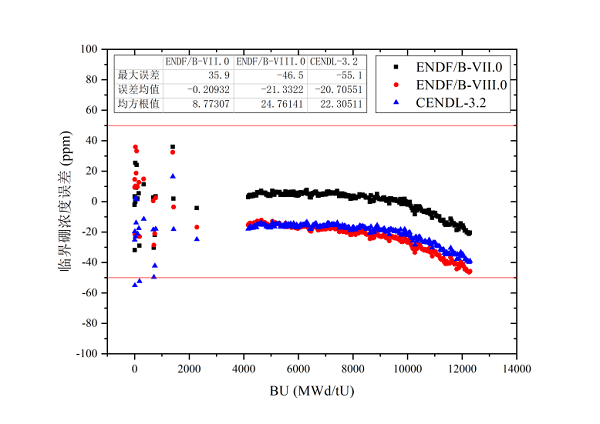XJTU's research team develops physical analysis technology for nuclear reactor core

The discrepancy between the critical boron concentration and measurement results in the first cycle of Hualong One (HPR1000).
The Nuclear Engineering Computational Physics Lab (NECP), led by Professor Wu Hongchun from the School of Nuclear Science and Technology at Xi'an Jiaotong University (XJTU), has achieved a significant breakthrough after over two decades of dedicated research.
They successfully realized the full domestication of software for the entire process from nuclear database creation to reactor core physical analysis based on China's independently developed nuclear database. The related findings were published in the journal SCIENTIA SINICA Technologica, laying a solid foundation for China's autonomous nuclear power technology.
The core of reactor physics analysis relies on fundamental data such as the probability of neutrons at different energies interacting with atomic nuclei in reactor materials (nuclear reaction cross-sections) and the energy/angular distributions of secondary particles post-reaction.
These data originate from evaluated nuclear databases. International databases like the United States' ENDF/B and Japan's JENDL have long dominated the field. Although China has its own evaluated database, CENDL-3.2, it lacks critical data such as thermal neutron scattering laws for light water.
The NECP independently developed the nuclear data processing software NECP-Atlas, supplementing CENDL-3.2 with missing thermal scattering data for light water and creating multigroup nuclear databases for reactor physics analysis software.
Building on the domestic reactor-ready nuclear database, the NECP developed Bamboo-C, a pressurized water reactor core physics analysis software. Capable of modeling both square and hexagonal fuel assembly cores, Bamboo-C enables industrial applications such as steady-state/transient core analysis and in-core/out-of-core detector response simulations.
To date, Bamboo-C has supported 238 operational cycles across various reactor types in China's nuclear power plants, with 54 percent of the nation's nuclear units adopting the software. The National Nuclear Safety Administration under China's Ministry of Ecology and Environment has designated Bamboo-C as the sole domestically developed alternative software for reactor core analysis review, establishing it as a benchmark for safety evaluations.

